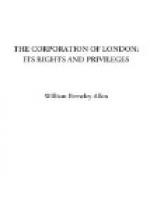On some points the Common Council are to be exalted at the expense of the Court of Aldermen. They are to administer the money and funds of the City, subject to the audit of three persons annually elected, an abstract of whose statement is to be laid before Parliament. The Corporation are therefore deemed unworthy or incompetent to manage their own finances. Men of business are told that their ignorance is so crass, or their honesty so doubtful, that the Legislature is compelled to keep a watchful eye on their expenditure. The proposition is as absurd as it is insulting and uncalled for. The Corporation are further to have no power to sell, mortgage, or lease their own estates. It may, perchance, be true, that in former times less regard was paid to the discovery of secure and profitable investments than suits the more grasping spirit of the present times. It may also be that greater extravagance was occasionally exhibited than would now be either justifiable or tolerable. But on neither of these grounds was it fitting to affix such a stigma, to pass such a vote of censure, on the existing governing body. Many economical reforms have of late years been spontaneously introduced, and an unmistakable tendency shown to make such further retrenchments as might be consistent with the efficiency of the public service. No doubt the expenses attendant on the collection of the City’s income are susceptible of reduction, nor would it be amiss if the heavy outlay connected with the civic government were lightened of some of its items. Still, these are mere questions of detail, and might fairly be left to the good taste, judgment, and discretion of the municipal magistrates. The steps already taken by the Common Council clearly evince their desire to keep pace with the liberalism of the age. Since the year 1835, the sum of at least 100,000 pounds has been offered on the altar of public opinion by the gradual abolition of the fines and fees which restricted the freedom of the City. In the same spirit they sacrificed the street tolls, which annually produced upwards of 5,000 pounds, as soon as they had redeemed the mortgage which enabled them to lay out the new street running north from Farringdon Street. They have also courted publicity, by admitting to their deliberations the reporters of the public press, and by publishing minutes of their proceedings and detailed statements of the receipt and expenditure of public moneys. In these and many similar ways they have manifested their anxiety to act in strict good faith towards their constituents, and to do the utmost in their power to promote the welfare of the City of London. No allegations, indeed, have been made against their scrupulously honourable administration of the funds intrusted to their stewardship. Their integrity has never been impugned by their bitterest enemies—the charges that have been brought forward reflect only upon their judgment. They are accused of lavishing untold sums upon idle pageantry and luxurious entertainments, while they have neglected to improve the great thoroughfares, to cleanse the river, and generally to embellish the metropolis and ameliorate the sanitary condition of its inhabitants. It is worth while to consider how much of truth lies in these accusations.




